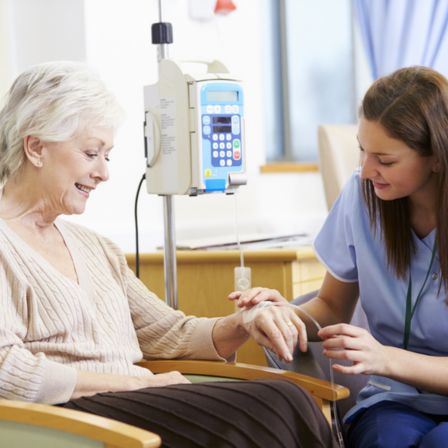Chemotherapy
Contact Us
Request an AppointmentPlease note a referral letter is required before an appointment can be confirmed.
Please note a referral letter is required before an appointment can be confirmed.
Please note a referral letter is required before an appointment can be confirmed.
About chemotherapy
Chemotherapy is the use of anti-cancer (cytotoxic) drugs to destroy cancer cells in the body by stopping or slowing the growth of cancer cells.
The type of chemotherapy drugs you will receive depend on various factors, including the type and stage of your cancer, overall health, previous cancer treatment, and your personal goals and preferences. Your consultant will discuss this with you and prescribe treatment based on your specific needs.
Chemotherapy can also harm healthy cells, such as the cells that line your mouth and intestines, or cause your hair to fall out. Damaging healthy cells causes side effects, however these side effects get better or go away once chemotherapy treatment is complete.
This depends on the type and the stage of your cancer; however, chemotherapy generally sets out to do the following:
- Cure cancer: by destroying cancer cells so they are no longer detected in your body.
- Control cancer: by keeping cancer from spreading, slowing its growth, or destroying cancer cells that have spread to other parts of your body.
- Ease cancer symptoms (palliative care): using chemotherapy to shrink tumours that are causing pain or discomfort.
Chemotherapy can be used to:
- Reduce the size of cancer: this is known as neo-adjuvant chemotherapy. Chemotherapy can be given to shrink a cancer before surgery or radiotherapy. This can make it easier to remove during surgery or make radiotherapy work better. If curing the cancer is not possible, it can shrink cancers that are causing pain and pressure.
- Prevent cancer coming back after surgery: this is known as adjuvant chemotherapy. Even if your surgery was successful in removing all visible cancer, there may be a chance of your cancer returning. Microscopic pieces of cancer sometimes remain and are undetectable with X-ray or scans. Depending on your specific case, you may benefit from adjuvant therapy, since this additional treatment may reduce the risk of your cancer recurring.
- Control cancer: chemotherapy can help prevent cancer from spreading by slowing its growth, or destroying cancer cells that have returned (recurrent cancer) or spread to other parts of your body (metastatic cancer).
- Ease cancer symptoms: if a cure is not possible, chemotherapy may be given to shrink and control the cancer, or to reduce the number of cancer cells. This may then improve your quality of life. This is called palliative treatment.
- Complement alternative treatments: chemotherapy can help radiation therapy and biological therapy work more effectively.
Some chemotherapy treatments are given as tablets or capsules which are called oral chemotherapy, but most are given by drip (infusion) into a vein.
The drugs go into the bloodstream and travel throughout the body to treat the cancer cells wherever they are. Occasionally just one chemotherapy drug is used, but often a combination of two, three or more drugs is given.
Treatment schedules for chemotherapy vary widely, depending on the type of cancer you have and how advanced it is. Your consultant will discuss these options with you.
To help you keep track of your treatment, we will provide you a treatment passport. This document will help you keep track of your appointments, dosage (oral chemotherapy), side effects, and any other information.
Chemotherapy affects people in different ways. How you feel depends on how healthy you are before treatment, your type of cancer, how advanced it is, the kind of chemotherapy you are receiving, and the dose.
Every patient is different, so you may get many side-effects, some, or none at all. It all depends on the type and the amount of drugs you get and how your body reacts to them. Unfortunately, when working on the cancerous cells, the drugs can also affect the healthy cells.
Some common side effects include:
- Infection
- Infertility
- Bruising
- Nausea and/or sickness
- Hair loss
- Sore mouth
- Numbness/pins and needles
- Fatigue
- Loss of appetite/taste
Your care team will explain to you the type of side effects that could be experienced as a result of the chemotherapy drugs being used for your treatment.
In addition to (or instead of) chemotherapy, you may require:
- Hormonal therapy in tablet or injection formats for e.g. breast or prostate cancer
- Monoclonal antibodies for certain types of lymphoma
- Targeted therapies for some lung and bowel cancers
- Immunotherapy for specific forms of lung cancer, melanoma, cervical and other cancers

Chemotherapy Tips
Every patient will experience the side-effects of chemotherapy in different ways. Read about some tips on how to cope with the more common side-effects associated with this treatment.
Frequently Asked Questions
The duration of the chemotherapy treatment will depend on the type and stage of your cancer. Individual chemotherapy sessions can take anywhere from a few minutes to an entire day.
While certain chemotherapy treatments may cause hair loss, hair thinning is a more common side effect. However, if you are receiving a type of treatment that can lead to hair loss, this will occur approximately two weeks after the first treatment session.







.jpg?sfvrsn=bc97231b_1)


